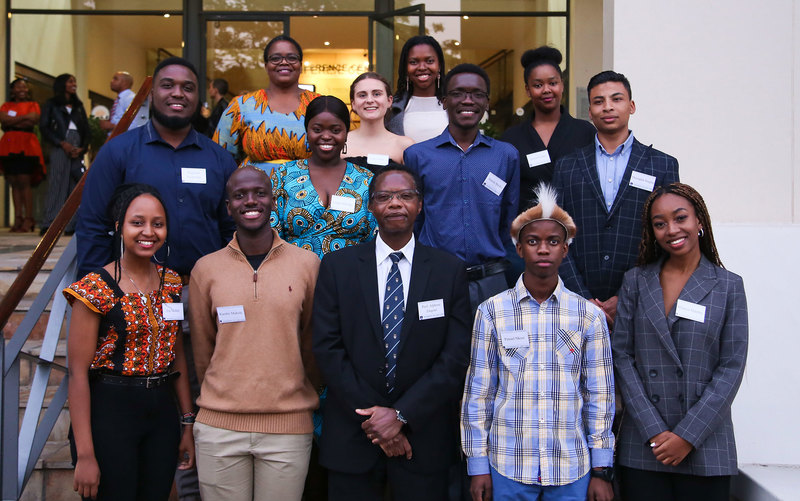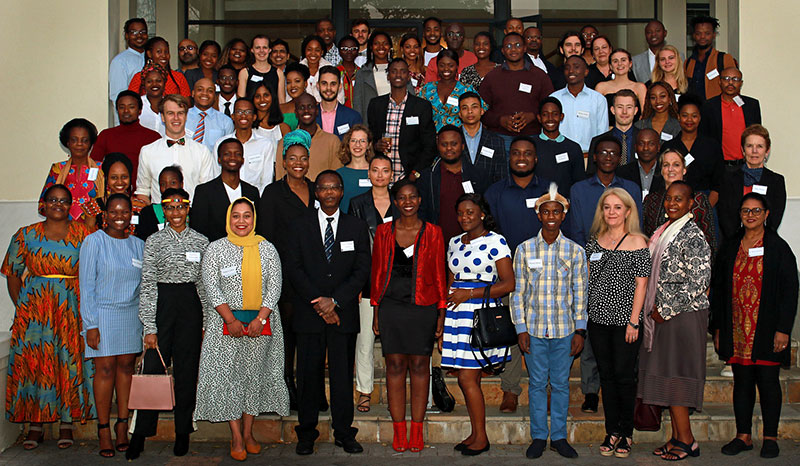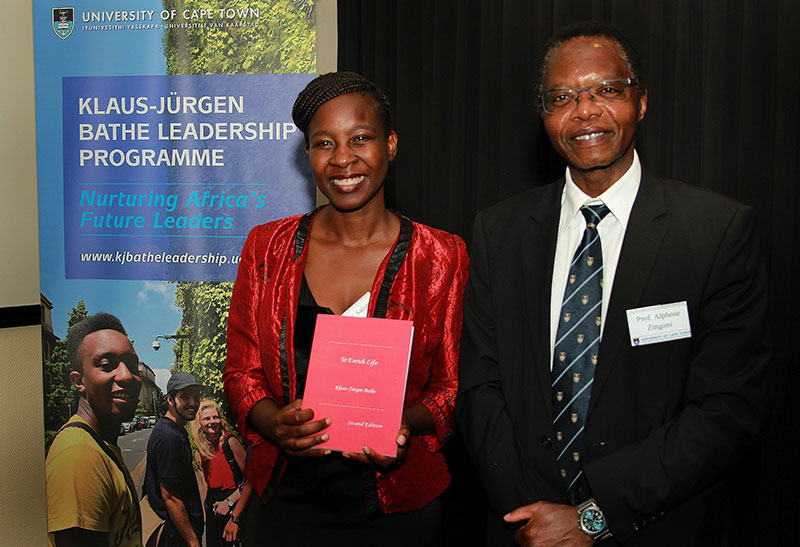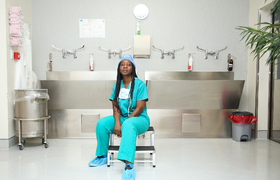Young UCT leaders encouraged to remain authentic
28 February 2020 | Story Nadia Krige. Read time 7 min.
As the young leaders of today rise through the ranks and become the global leaders of tomorrow, authenticity should always remain their guiding principle. This is the message that Associate Professor Salome Maswime, head of Global Surgery at the University of Cape Town (UCT), shared with newly inducted, current and former scholars of the Klaus-Jürgen Bathe (KJB) Leadership Programme.
Maswime was the guest speaker at a special dinner held to celebrate the induction of 11 new scholars to the prestigious programme on Thursday, 27 February.
The dinner was held at the J&J Conference Centre, Belmont Square and brought together new and current KJB scholars and alumni, as well as faculty and staff members from across UCT.
Grooming Africa’s future leaders
The KJB Leadership Scholarships are awarded on an annual basis to UCT undergraduate students enrolled in any of the six faculties who show exceptional leadership potential.
The programme provides students with financial support as they work toward completing their chosen degree programme, while offering them opportunities to further develop their leadership qualities through additional programmes and internships.
This year, a cohort of 11 students has been inducted to the KJB Leadership Programme. They are Karabo Makole (EBE), Khanya Mamba (Commerce), Liz Mubari (EBE), Patrick Mwaka (EBE), Reginald Nyakonda (EBE), Fezeka Nzama (Commerce), Penuel Nkosi (Commerce), Leago Sebesho (Health), Mustapha Singlee (Science), Aviwe Vilane (Law) and Lucy Wills (EBE).
“The primary goal of the programme is to produce graduates with outstanding leadership qualities and a strong sense of social justice.”
“The primary goal of the programme is to produce graduates with outstanding leadership qualities and a strong sense of social justice who will go on to play leading roles in business, in government, in civil society in South Africa and the African continent as a whole,” said Professor Alphose Zingoni, director of the KJB Leadership Programme and Professor of Structural Engineering & Mechanics at UCT.
Since the programme was launched in 2015, it has provided 61 young leaders at UCT with scholarships.

As part of the programme, scholars are expected to participate in various leadership activities, including enrolling in two leadership electives in addition to their degree programmes. They will also be expected to complete an internship of at least six weeks at a reputable organisation. During this time, the hope is that the scholars will rub shoulders with and learn from leaders working in their chosen field to develop their own leadership skills.
Zingoni said that they encourage scholars to continue building strong networks both within and outside the university.
“As new scholars, you walk in the footsteps of those who have already graduated and have the opportunity also to interact with those who joined last year,” he said. “We hope that you will establish life-long friendships that will extend well into your leadership careers.”
Bathe’s vision for a better South Africa
Underpinning the KJB Leadership Programme is the dream of an Africa and South Africa that can offer prosperity to all its people.
Founder, Professor Klaus-Jürgen Bathe, Professor of Mechanical Engineering at the Massachusetts Institute of Technology (MIT), has a long-standing relationship with UCT that was established when he graduated from the Faculty of Engineering in 1967 as the Gold Medallist of that year.
Unfortunately, Bathe was unable to attend the event due to prior commitments, but asked Zingoni to read a letter of congratulations and encouragement to the students on his behalf.
In the letter, Bathe pointed out that despite its wonderful people and abundant resources, South Africa faces major problems.
“The synergy of your working together for a better future of South Africa and other African countries is very important.”
“It is imperative to reach prosperity for each person,” he wrote. “And this requires good, long-term leadership. You represent the future of your country. We hope that you will provide this leadership for South Africa and beyond.”
Underscoring the importance of building strong networks, he encouraged scholars to use opportunities like these dinners to get to know each other better.
“The synergy of your working together for a better future of South Africa and other African countries is very important,” he said.
He concluded by wishing students well and encouraging them to continue working towards their dreams of a better country.
Cultivating authentic leadership
Bathe’s message was followed by an inspiring address by Maswime, who encouraged students to embrace the idea of ‘authentic leadership’.
She explained that this referred to two different aspects: the authenticity of the leader to remain true to who they are regardless of the setting; and their leadership style, characterised by integrity, fearlessness and honesty.
Since the programme was launched in 2015, it has provided 61 young leaders at UCT with scholarships.

“As I look back at my history and reflect on my work journey, after finishing my internship, I was faced with a world full of possibilities,” she recalled. “But it was when I signed the first death certificate of a pregnant woman that I knew what my calling was.”
From that moment on, Maswime dedicated her work to combating avoidable stillbirths and maternal deaths in Africa.
“I couldn’t let go of the injustice of seeing women die at our hands from conditions that don’t kill women in other parts of the world,” she explained.
“I couldn’t let go of the injustice of seeing women die … from conditions that don’t kill women in other parts of the world.”
Apart from a string of prestigious accolades – including the Discovery Foundation Massachusetts General Hospital Fellowship Award and Mail & Guardian’s Top 200 South Africans in 2017 – Maswime is recognised as an expert in maternal health and global surgery.
No stranger to success, she warned the newly inducted scholars not to let their own successes derail them.
“Often success is even more difficult than failure. The attention and acknowledgement can be somewhat overwhelming,” she said. “It’s not easy to be a rising star. It requires authenticity.”
She ended her speech by naming a few of South Africa’s most prominent leaders – including President Cyril Ramaphosa and Bavelile Hlongwa, the late deputy minister of mineral resources and energy – who had started their careers at the head of student organisations and societies.
“Why am I giving you all of these examples? Because young leaders become global leaders, authentic leaders never stop leading and it’s never too early to start leading.”
She concluded her speech by encouraging the scholars to “fly with the eagles” and surround themselves with people who believe in, trust, energise and accept them.
“I hope your names will be written in history books one day,” she said.
 This work is licensed under a Creative Commons Attribution-NoDerivatives 4.0 International License.
This work is licensed under a Creative Commons Attribution-NoDerivatives 4.0 International License.
Please view the republishing articles page for more information.










